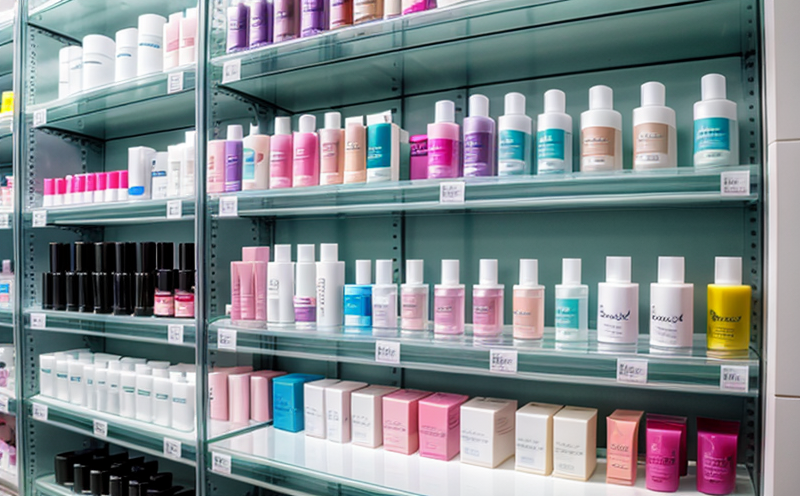Stability Testing of Hyaluronic Acid in Cosmetics
The stability testing of hyaluronic acid (HA) in cosmetics is a critical process that ensures the integrity, safety, and efficacy of cosmetic formulations over their shelf life. Hyaluronic acid, a naturally occurring polysaccharide known for its moisturizing properties, plays a pivotal role in many skincare products such as serums, moisturizers, and treatments.
Stability testing evaluates how the formulation containing hyaluronic acid behaves under various environmental conditions that mimic real-world storage and usage scenarios. This ensures that the product remains stable, safe for use, and retains its efficacy throughout its shelf life. The test involves exposing the sample to different temperature and humidity conditions over a specified period.
During this process, we monitor several key parameters including viscosity, pH levels, particle size distribution, and overall stability of the formulation. These tests are conducted in accordance with international standards such as ISO 25079:2016 for cosmetic product testing. The results provide crucial insights into the chemical and physical behavior of HA under different environmental conditions.
The primary goal is to ensure that the hyaluronic acid remains potent, stable, and safe throughout its shelf life. This not only enhances consumer trust but also helps in meeting regulatory compliance requirements set by various countries around the world. Our testing facilities are equipped with state-of-the-art instruments capable of providing accurate data under controlled conditions.
- Why Choose This Test: Ensures product integrity and safety over time, enhances consumer trust, and meets regulatory compliance standards.
- Customer Impact and Satisfaction: By ensuring the stability of HA in cosmetics, we help brands maintain high-quality products that are effective and safe for consumers. This leads to increased customer satisfaction and loyalty.
Applied Standards
The stability testing of hyaluronic acid in cosmetics is governed by several international standards that ensure the accuracy and reliability of the tests. These include ISO 25079:2016, which provides a framework for cosmetic product testing, and ASTM D4583-18, which specifies the requirements for cosmetic products containing hyaluronic acid.
The International Organization for Standardization (ISO) standards are widely recognized globally. They provide clear guidelines on how to conduct stability tests, including temperature and humidity conditions, duration of testing, and methods for evaluating the results. This ensures that all participants in the industry follow a consistent approach, enhancing comparability across different labs.
The American Society for Testing and Materials (ASTM) standards offer complementary guidance specifically tailored towards cosmetic products containing hyaluronic acid. These standards provide detailed procedures for preparing samples, conducting tests, and interpreting results. Compliance with these standards not only ensures that your product meets regulatory requirements but also enhances its reputation in the market.
Additionally, European Norms (EN) are particularly relevant if you are targeting markets within the EU. EN 32170 specifies the criteria for testing cosmetic products containing hyaluronic acid, ensuring consistency and reliability across Europe. By adhering to these standards, we help our clients achieve compliance with local regulations.
Why Choose This Test
- Enhanced Product Integrity: Ensuring that hyaluronic acid remains stable and effective throughout the shelf life of the product.
- Regulatory Compliance: Meeting stringent regulatory standards to ensure safe and effective products.
- Consumer Trust: Building consumer confidence by providing evidence of product stability over time.
- Efficiency in Development: Identifying potential issues early in the development process, saving time and resources.
- Market Differentiation: Offering superior products that stand out from competitors.
- Cost Savings: Avoiding costly recalls or product failures due to instability after release.
Customer Impact and Satisfaction
The stability testing of hyaluronic acid in cosmetics has a direct impact on customer satisfaction. By ensuring that the product remains stable and effective throughout its shelf life, we enhance consumer trust and loyalty. This is particularly important for products containing hyaluronic acid as it is often used for its moisturizing properties.
Our testing process provides clear evidence of product stability under various environmental conditions. This allows brands to confidently market their products with the assurance that they will perform consistently across different regions and climates. For consumers, this means receiving a high-quality product that delivers on its promises every time it is used.
The results from our stability tests also help in making informed decisions regarding formulation adjustments if necessary. This proactive approach ensures that any issues are addressed before the product reaches the market, leading to fewer complaints and returns. Ultimately, this translates into higher customer satisfaction and loyalty for brands who choose to invest in thorough testing.
- Enhanced Product Integrity: Ensures consistent performance of hyaluronic acid in cosmetics across different environments.
- Regulatory Compliance: Helps meet stringent regulatory standards, ensuring safe and effective products.
- Consumer Trust: Builds confidence among consumers regarding the quality and reliability of the product.
- Efficiency in Development: Identifies potential problems early on, saving time and resources during development stages.
- Market Differentiation: Offers superior products that can differentiate themselves from competitors based on their stability.
- Cost Savings: Avoids costly recalls or product failures due to instability after release.





